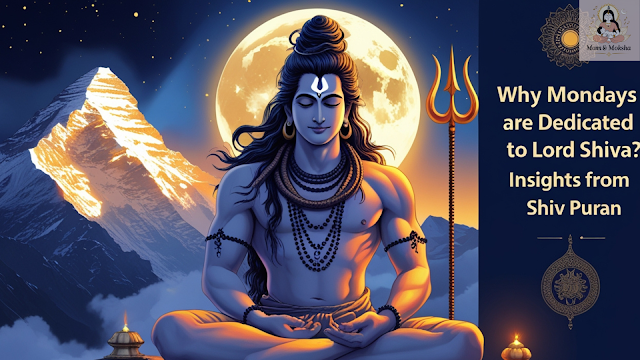Introduction
In Sanatan Dharma, each day of the week holds sacred significance—but Monday (Somvar) holds a special, divine connection with Lord Shiva, the Supreme God of destruction, transformation, and compassion. From ancient scriptures like the Shiv Puran to modern-day fasting practices, Monday continues to be the most spiritually charged day for Mahadev devotees. But why is this so? Let’s dive deep into the scriptural, mythological, and spiritual layers behind this sacred tradition.
The Spiritual Meaning of Somvar (Monday)
The word ‘Somvar’ comes from the Sanskrit word ‘Soma’, meaning the Moon. Lord Shiva is known as Somnath, the one who wears the moon on his matted locks. In fact, the moon represents the mind and emotions—two things Lord Shiva governs with stillness and detachment.
Hence, Monday becomes the most suitable day to focus on calming the mind, meditating, and surrendering to the serene energies of Bholenath.
Shiv Puran Reference: The Tale of Chandra Dev and His Curse
According to Shiv Puran (Rudra Samhita, Section 2), the moon god Chandra Dev was cursed by Daksha Prajapati for showing favoritism among his 27 wives (the Nakshatras). Afflicted by the curse, Chandra began to fade away.
Desperate and weakened, he prayed to Lord Shiva for salvation. Pleased by his devotion, Shiva blessed him and wore him on His head, thus becoming Chandrashekhar. This is why Mondays (linked to the Moon) became a day of great importance for worshipping Shiva with devotion.
Why Devotees Fast on Mondays (Somvar Vrat)?
-
To Seek Blessings in Marriage: Women observe Somvar Vrat to seek a life partner with Shiva-like qualities—calm, strong, and devoted.
-
To Attain Peace of Mind: Fasting and chanting Shiva mantras help reduce anxiety and bring mental clarity.
-
To Cleanse Karma: Shiva is known as the destroyer of sins (Pap Nashak). Fasting with sincerity helps purify past actions.
Mantra for the Day:
 |
Monday Rituals and Offerings to Please Lord Shiva
-
Milk Abhishekam: Symbolizes purity and surrender
-
Bilva Leaves: Said to cool Shiva’s energy and cleanse karma
-
Dhoop and Deepam: Lighting incense and oil lamps creates a divine atmosphere
-
Chanting Rudram or Shiva Chalisa
Spiritual Parenting Insight:
Introducing children to Monday Shiva rituals through stories and simple mantras creates a spiritual foundation early in life. It teaches the values of discipline, devotion, and calmness—rooted in Indian tradition.
Tip: Light a lamp with your child every Monday and chant “Om Namah Shivaya” together.
Why This Knowledge Still Matters Today
In a world full of distractions and chaos, dedicating one day a week to silence, surrender, and self-awareness can be life-changing. Mondays with Mahadev aren’t just rituals—they’re a reminder to pause, reflect, and connect with the divine presence within us.
Conclusion
Whether it’s through a humble chant, a fast, or a quiet prayer, Monday offers a beautiful opportunity to grow closer to Lord Shiva. The Shiv Puran reminds us that Mahadev is Ashutosh—the one who is easily pleased. Even a drop of true devotion offered on Somvar can open the gates to peace, health, and spiritual fulfillment.


